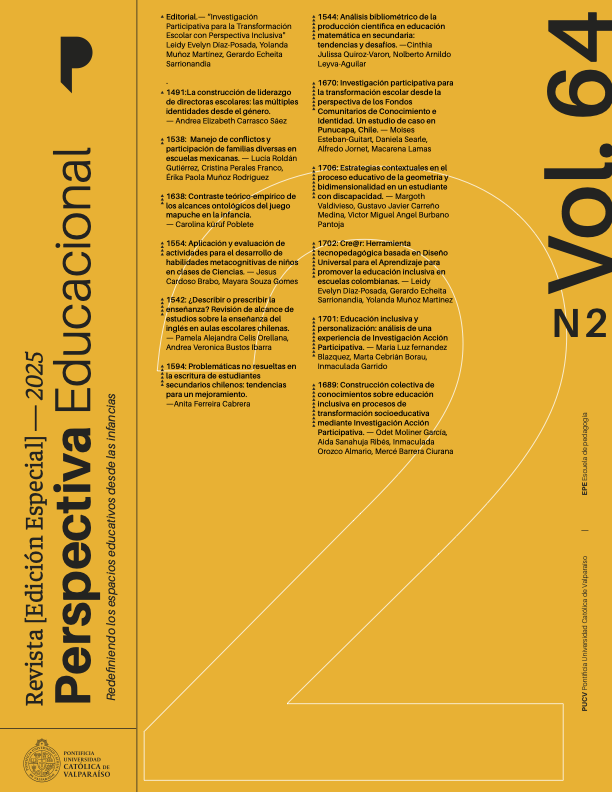Participatory research for school transformation from the community funds of knowledge and identity approach.
DOI:
https://doi.org/10.4151/07189729-Vol.64-Iss.2-Art.1670Keywords:
Inclusive education community participation participatory research qualitative researchAbstract
To materialize the inclusion as a right and educational praxis, this article describes the process of designing, implementing and evaluating an educational project for students between 6 and 13 years of age based on the Community Funds of Knowledge and Identity (CFKI) approach. It has been suggested the collaboration among formal, non formal and informal agents as an strategy to implement inclusive educational practices. In doing so, the term of socio-educational ecosystems for inclusion has been suggested recently. However, a lack of research is identified in developing and evaluating the education as a common good in inclusive communitarian settings. In doing so, it is followed the perspective of CFK&I. By community funds of knowledge and identity we mean a legacy, heritage, memory or public-collective inheritance (for example an archaeological site) through which school learning is contextualized and leading to processes of shared identity. At a methodological level, a Design-Based Research approach is developed involving the creation of a driving group including different educational agents (rural school, university), social and community agents (agents of the El Robledal Refuge). The results allow us to empirically illustrate the design and impact of the educational project. Five phases are developed: presentation, creation of the socio-educational ecosystem, codesign process, implementation, and participatory evaluation. A pre and posttest was used to evaluate the impact of the Project on students learning. 15,5% increased from the initial evaluation, identifing some strenghts (i.e., collaborative working, meaningful learning, collective identity making) and limitations (i.e., risk of discontinuity of the project, few time to implement it, lack of economical resources) of the approach according to participants. Finally, the perspective of the CFK&I is discussed in the framework of socio-educational ecosystems for inclusion. It is highlighted three main contributions. First, the role of the study group as a community of practice, appropriating the theoretical and methodological framework. Second, a communitarian scan was conducted to identify collectively a community funds of knowledge and identity. Third, a pre and posttest was implemented to empirically document the impact of the educational project on students’ learning. However, is is identified as a limitation and area for imporvement the need to increase the implementation and development time of the educational project in order to guarantee, in addition to its impact, its consistency and continuity both in its interdisciplinary link with different subjects, as well as throughout the school year. In this sense, incorporating a consolidation phase, for example, linked to consolidating the contents and guaranteeing the lessons learned, would make it possible to sustain the project beyond the mere intensification in the case considered during the weeks of field work. In short, we consider that the main contribution of this research lies in empirically describing a procedure that makes it possible to implement the notion of “socio-educational ecosystems for inclusion” necessary to achieve the transition from inclusive education as a “principle” to its consideration as a “right”.
References
Ainscow, M., & West, M. (2008). Mejorar las escuelas urbanas. Liderazgo y colaboración. Narcea.
Arbeláez, M., & Onrubia, J. (2016). Análisis bibliométrico y de contenido. Dos metodologías complementarias para el análisis de la revista colombiana Educación y Cultura. Revista de Investigaciones UCM, 14, 14-31. https://doi.org/10.22383/ri.v14i1.5
Barab, S., & Squire, K. (2004). Design-based research: Putting a stake in the ground. Journal of the Learning Sciences, 13(1), 1-14, https://doi.org/10.1207/s15327809jls1301_1
Boned, P., Iglesias, E., Sierralta, & Esteban-Guitart, M. (2024a). Building a socio-educational ecosystem from the community funds of knowledge and identity approach. An illustrative example in Catalonia, Spain. Acta Psychologica, 249, https://doi.org/10.1016/j.actpsy.2024.104449
Boned, P., Gubern, E., Quintana, E., & Esteban-Guitart, M. (2024b). El diseño de proyectos educativos en contextos comuntiarios. Un estudio de caso en Celrà, Catalunya, España. Revista CS, 44, 1-24. https://doi.org/10.18046/recs.i44.13
Brown, A. L. (1992). Design experiments: Theoretical and methodological challenges in creating complex interventions in classroom settings. The Journal of the Learning Sciences, 2(2), 141-178. https://doi.org/10.1207/s15327809jls0202_2
Calderón-Almentros, I., & Echeita, G. (2022). Inclusive education as a human right. En G. Noblit (Ed.), Oxford Research Encyclopedia of Education (pp. 1-20). Oxford University Press. https://doi.org/10.1093/acrefore/9780190264093.013.1243
Collet, J., Naranjo, M., & Soldevila, J. (Coords.). (2024). Educación inclusiva global. Octaedro.
Echeita, G. (2017). Educación inclusiva. Sonrisas y lágrimas. Aula Abierta, 46(2), 17-24. https://doi.org/10.17811/rifie.46.2017.17-24
Echeita, G., & Ainscow, M. (2011). La educación inclusiva como derecho: marco de referencia y pautas de acción para el desarrollo de una revolución pendiente. Tejuelo: Revista de Didáctica de la Lengua y la Literatura, 12, 26-46.
Esteban-Guitart, M. (2016). Funds of identity. Connecting meaningful learning experiences in and out of school. Cambridge University Press.
Esteban-Guitart, M. (Ed.) (2024). Funds of knowledge and identity pedagogies for social justice. International perspectives and praxis from communities, classrooms, and curriculum. Routledge.
Esteban-Guitart, M., Vila, I., & Bastiani, J. (2010). El carácter fronterizo de las identidades contemporáneas. El caso de Chiapas. Aposta. Revista de Ciencias Sociales, 44, 1-19.
Esteban-Guitart, M., Serra, J. M., & Llopart, M. (2021). The role of the study group in the funds of knowledge approach. Mind, Culture, and Activity, 25(3), 216-228. https://doi.org/10.1080/10749039.2018.1448871
Esteban-Guitart, M., Lalueza, J. L., & Sánchez, J. E. (2024a). Pedagogías para la inclusión educativa y la justicia social desde una perspectiva sociocultural. Revista CS, 44, 1-7. https://doi.org/10.18046/recs.i44.14
Esteban-Guitart, M., Sierralta, A., Searle, D., & Subero, D. (2024b). Aportes de la teoría biecológica de Bronfenbrenner a la investigación e intervención educativa. Innovación Educativa, 34, 1-13. https://doi.org/10.15304/ie.34.9638
Esteban-Guitart, M. Iglesias, E., Lalueza, J. L., & Palma, M. (2022). Lo común y lo público en las prácticas de enseñanza desde la perspectiva de los fondos comunitarios de conocimiento e identidad. Revista de Educación, 395, 237-262. https://doi.org/10.4438/1988-592X-RE-2’22-395-518
Esteban-Guitart, M., Iglesias, E., Serra, J. M., & Subero, D. (2023). Community funds of knowledge and identity: A mesogenetic approach to education. Anthropology & Education Quarterly, 54(3), 307-317. https://doi.org/10.1111/aeq.12451
Fernández-Blázquez, M. L. M., & Echeita, G. (2022). Hacia una educación más inclusiva: la transformación de un centro educativo. Teoría de la Educación. Revista Interuniversitaria, 35(1), 185-206. https://doi.org/10.14201/teri.27699
Gajardo, K., Cáceres, J., & Zardel, J. (2023). El concepto de inclusión desde las aproximaciones críticas emergentes. Revista Nacional e Internacional de Educación Inclusiva, 16(2), 34-50.
García-Romero, D., Redondo-Corbocado, P., & Míguez-Salina, G. (2023). Entre el monte y las aulas: Estudio de un proyecto endógeno para intergar educación y sostenibilidad local. Estudios Pedagógicos, 49(2), 393-416. https://doi.org/10.4067/S0718-07052023000200393
Gutiérrez, K. D., & Penuel, W. R. (2014). Relevance to practice as a criterion for rigor. Educational researcher, 43(1), 19-23. https://doi.org/10.3102/0013189X13520289
Jornet, A., Penuel, W. R., Esteban-Guitart, M., & Akkermann, S. (2025). Socio-educational ecologies for learning, social change, and future thinking: expanding educational psychology’s boundaries. Acta Psychologica, 258, 1-9. https://doi.org/10.1016/j.actpsy.2025.105156
Lalueza, J. L., Karamillo, K., Barbarino, G., & Camps-Orfila, S. (2024). Estratègies per establir continuïtats entre escola i comunitat. Ámbits de Psicopedagogia i Orientació, 61, 3-20. https://doi.org/10.32093/ambits.vi60504963
Lamas-Aicón, M., & Thibaut, P. (2021). Continuidad educativa y fondos de conocimiento de familias venezolanas en Chile. Revista Internacional de Educación para la Justicia Social, 10(1), 41-54. https://doi.org/10.15366/riejs.2021.10.1.003
Lamas-Aicón, M., Jaramillo, K., & Jiménez, F. (2024). Funds of knowledge in Chile: A possibility to counteract racism. In M. Esteban-Guitart (Ed.), Funds of knowledge and identity pedagogies for social justice (pp. 129-144). Routledge.
McIntyre, E., Rosebery, A., & González, N. (Eds.). (2001). Classroom diversity: Connecting curriculum to students’ lives. Heinemann.
Moll, L. (2019). Elaborating funds of knowledge: Community-oriented practices in international contexts. Literacy Research: Theory, Method, and Practice, 68(1), 130-138. https://doi.org/10.1177/2381336919870805
Moll, L. C., Amanti, C., Neff, D., & González, N. (1992). Funds of knowledge for teaching: using a qualitative approach to connect homes and classrooms. Theory Into Practice, 31(2), 132-141. https://doi.org/10.1080/00405849209543534
Muñoz, G., Quintriqueo, S., Torres, H., & Galaz, A. (2022). Küpan y Tuwün como Fondos de Conocimiento para contextualizar la educación intercultural en territorio Mapuche. Revista Internacional de Educación para la Justícia Social, 11(1), 13-30. https://doi.org/10.15366/riejs2022.11.1.001
Paris, D. (2012). Culturally sustaining pedagogy: A needed change in stance, terminology, and practice. Educational Researcher, 41(3), 93-97. https://doi.org/10.3102/0013189X12441244
Penuel, W., Riedy, R., Barber, M. S., Peurach, D., LeBouef, W., & Clark, T. (2020). Principles of collaborative education research with stakeholders: Toward requirements for a new research and development infrastructure. Review of Educational Research, 90(5), 627-674. https://doi.org/10.3102/0034654320938126
Simón, C., Giné, C., & Echeita, G. (2016). Escuela, familia y comunidad: Construyendo alianzas para promover la inclusión. Revista Latinoamericana de Educación Inclusiva, 10(1), 25-42. https://doi.org/10.4067/S0718-73782016000100003
Valencia, R. R. (Ed.). (1997). The evolution of deficit thinking: Educational thought and practice. Routledge.
Villarruel, M. (2012). Entornos políticos y dilemas sociales: los horizontes de la educación inclusiva. Perspectiva Educacional, 51(2), 1-17. https://doi.org/10.4151/07189729-Vol.51-Iss.2-Art.105
Downloads
Published
How to Cite
Issue
Section
Categories
License
Copyright (c) 2025 Moises Esteban-Guitart, Daniela Searle, Alfredo Jornet, Macarena Lamas

This work is licensed under a Creative Commons Attribution-ShareAlike 4.0 International License.
The authors grant an exclusive licence, without time limit, for the manuscript to be published in the Perspectiva Educacional journal, published by the Pontificia Universidad Católica of Valparaíso (Chile), through the School of Pedagogy.





